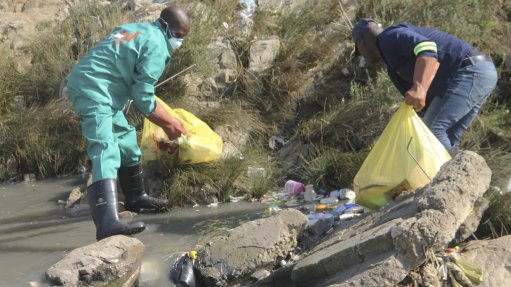
CLEANING INITIATIVE Teams cleaned sections of the Jukskei river bank and removed solid waste from the rivers
The ‘Clear Rivers’ campaign, an initiative of the Department of Water and Sanitation (DWS) and its partners, has managed to clear more than 50 rivers of pollution to date, the department reports.
The campaign, the umbrella initiative for all clean-ups across South Africa, was established by the DWS with the main aim of creating pollution-free freshwater ecosystems and environmental-savvy communities, which are actively involved and engaged in the management of water resources in the country.
The campaign is informed by the need for water security, particularly in the face of global climate change, and is a “clarion call for a national and unified approach to protect our freshwater ecosystems, which include rivers, wetlands and broader catchments”, according to the department.
“Given that the country is also gripped by one of the worst droughts in decades, there has never been a more important time to remind South Africans that water does not originate from the tap and that clearing our freshwater ecosystems is the responsibility of everyone living in South Africa,” the department noted in a press statement last month.
Some of the rivers cleaned include the Ngwanele river, the Kuils river, the Luvuvhu river, the Siza river, the Qumbu river, the Molopo river, the Orange river and the Moreleta river.
During Mandela Day celebrations last month, Water and Sanitation Minister Nomvula Mokonyane joined the Clear Rivers campaign activities by leading the cleaning of the Jukskei river, in Alexandra, Gauteng, while Deputy Minister Pamela Tshwete paid tribute to former President Nelson Mandela by dedicating time to clean the Mzingwenya river, in Esikhawini, KwaZulu-Natal.
Activities during the initiatives included cleaning the river banks, removing solid waste from the rivers, collecting the waste and moving it to a landfill site, as well as public education and awareness.
Jukskei Clean-Up
The Jukskei clean-up proved to be a “much- needed” initative, according to the DWS, which noted that, as the river is surrounded by the most developed areas in the country and influenced by human activities, it is “highly polluted, owing to large quantities of litter, debris, sewer outflows and effluent being discharged into the system by households and industries”.
The Jukskei clean-up team comprised business organisations, such as Plastics South Africa (SA), which also provided the bags for the clean-up, Power FM, The Mvula Trust, Group Five, the World Wide Fund for Nature, the National Economic Development and Labour Council, the Black Business Council, Kleen Health and government structures such as City of Tshwane, the Department of Environmental Affairs and Joburg Water.
“We must claim back our environment and, through the environment, we must grow the economy,” Mokonyane said at the clean-up. She reiterated Mandela’s comments that, if South Africa does not act on the right to clean water, it is as good as “just talking” about inequalities in the country. The issue of access to water was crucial to sustainable development, she pointed out.
Plastics SA sustainability director Douw Steyn noted that challenges in clean-ups such as these included the availability of volunteers, but he stressed the need for preventive action, such as proper waste management, as well as increased awareness and public education.
The Clear Rivers campaign continued for the rest of July; however, plans are in the pipeline to ensure that the campaign is implemented more regularly in future.